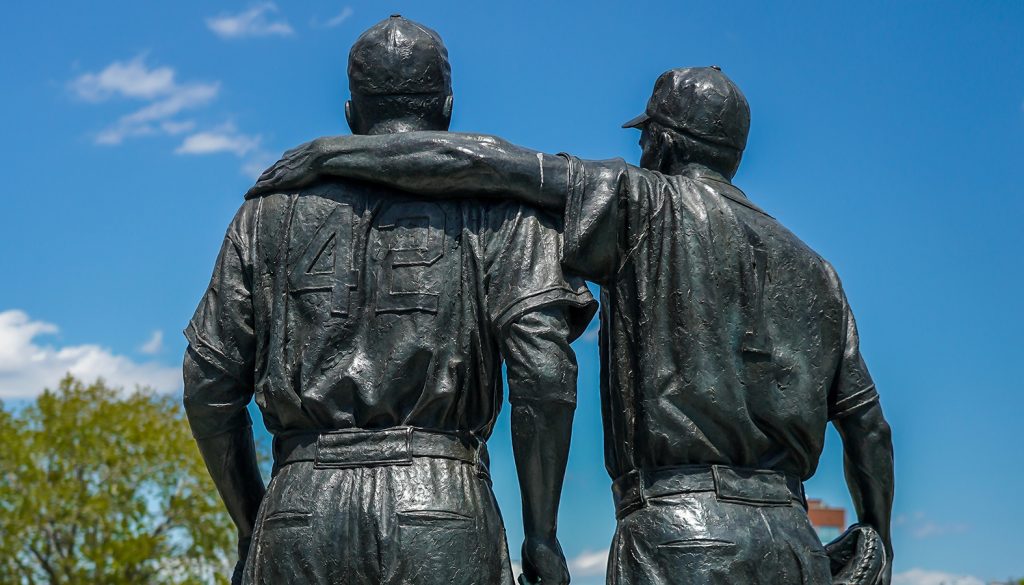Chris Taylor’s ninth inning game winning homerun in the Wild Card playoff game between the Dodgers and the St. Louis Cardinals may not go down in the annals of Dodger lore on the same level as the 1988 Kirk Gibson home run, but it’s a close second.
My son and I had the good fortune to attend the game. It turned out to be a memorable one not just for what took place on the field, but for what transpired during the game in the stands.
Going to baseball games, or any sporting event, is not as pleasurable as it used to be. The same thing can be said about flying in an airplane or going to the market. People are angry. There is a surplus of concerns, worry, and despair, and it has frayed the collective nerves of civil society.
Besides economic and global concerns of peace and stability, a pandemic has spawned a crisis deeper than the sum of its RNA, turning families against one another and neighbor against neighbor.
Baseball used to be a refuge against the world’s troubles. Not a cure, but an opportunity to attach diversionary significance to something that deep in our brains and in our hearts we understood was not particularly critical to the continuation of western civilization. But even baseball has not been fully vaccinated against the outside ills of our culture.
When my children were children, we stopped going to Dodger Stadium because the crowds had grown so unruly, profane, and even dangerous. After witnessing a rash of violent fights even in the “good” seats, we decided enough was enough. Thankfully, over time, things improved, and we returned.
My now adult children love the Dodgers, and they attend games when they can, as do my wife and I. Lazy summer evenings will invariably find the Dodger game on our TV.
So it was a very special day when two tickets for the Wild Card game between the Dodgers and St. Louis Cardinals fell into our laps. I thought it would be a great game. It was, but for a reason that had little to do with what transpired between the foul lines, great as that may have been.
My children only knew one grandfather, my own father having passed away years before I ever met their mother. My father-in-law, God rest his soul, was a man of quiet integrity and decency who knew a thing or two about how to conjugate the word “to love.” My kids certainly loved him, and his love of baseball was transfused to them in the process.
But my father-in-law was not perfect. He had one very profound and hard to reconcile flaw: He was a San Francisco Giants fan.
I am batting .667 when it comes to protecting my children from becoming Giants fans. One son, who is the only person in our family who doesn’t care for baseball, roots for the Giants. I am convinced he does this, one, to mess with his siblings, and two, as an act of solidarity toward the grandfather he loved.
One of many good and even holy things my father-in-law bequeathed to his grandchildren was how to treat people with kindness and dignity. He did this at every baseball game we attended with him. He might be wearing Giants gear, but he would start up conversations with Dodger fans and before the third inning was over, he had friends all around him.
My son and I sat next to two Cardinals fans during the Wild Card Game. We teased them about their “inappropriate attire” and before the first pitch, we were talking about our common love of the game and how it connected it to our fathers, and in the case of my son and me, a grandfather and father-in-law.
We never learned their names nor they ours, but it put a very tense game, which could have had much more “meaning” than it deserved, into a wonderful perspective. Like his grandfather before him, my son was being kind and respectful to a stranger. He had learned from his grandfather one of the great Christian commands: to be kind and respectful.
When the game ended on such a high note for us and a low one for our neighbors in the next seats, both my son and I felt melancholy. On the ride home, my son mentioned how this incredibly exciting game was so different than anything he had experienced, mainly because of the connection we made with these strangers and the shared joy we had over this brief respite from everything going on outside the confines of Chavez Ravine.
His grandfather would have smiled and given a wink.

